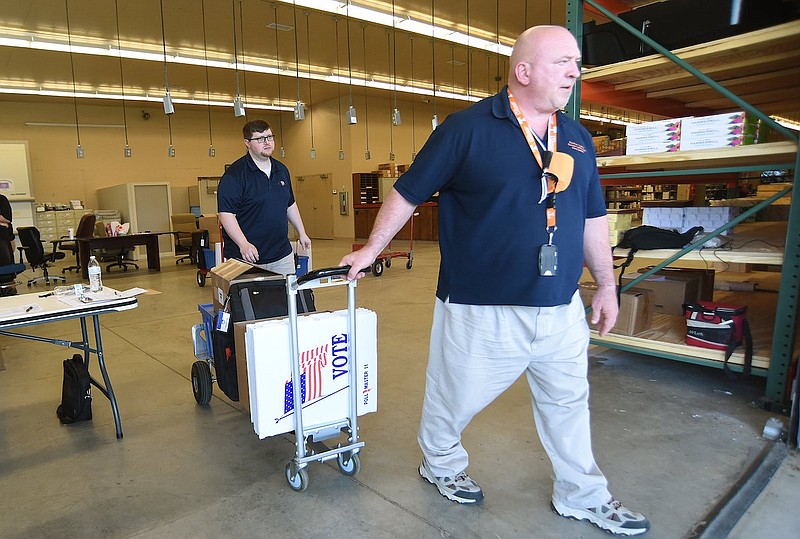NASHVILLE — Tennessee Republican lawmakers are mounting a new effort to limit local primary elections so that only those who declare a political party in advance can participate in that party’s primary — rather than letting voters select the party ballot of their choice on election day.
The measure, House Bill 405, cleared its first panel Wednesday on a voice vote in the Elections and Campaign Finance Subcommittee. Should it eventually pass the full House and Senate, it would take effect in August 2024, when there is a state and federal primary.
“Currently in the state of Tennessee, all voters are registered as unaffiliated voters right now,” freshman Rep. Bryan Richey, R-Alcoa, told subcommittee members. “You’re only picking a particular party whether it’s Republican or Democrat when you actually go in on that primary day to select that ballot.”
Richey likened it to members of a church congregation, who would not allow members of a church of another denomination down the road to pick their next pastor.
“The purpose of a primary is for Republican voters to decide who their Republican candidate’s going to be and for Democrat voters to decide who their candidates are going to be,” Richey added.
He cited several states, including Kentucky and Florida, that have closed primaries.
“What would end up happening is all voters in the state of Tennessee would end up being registered based off of their previous primary ballot that they pulled,” Ritchey said. “So if you pulled a Republican ballot, you would be registered as a Republican.”
If someone pulled a Democratic ballot, they would be registered as a Democrat.
“If you never voted in a primary in the state of Tennessee, you would be registered as an independent,” Richey added. “You’ll have the option to go onto the state’s election website and change your party affiliation at any point.”
He said the legislation would allow voters to pick their party affiliation until 30 days before an upcoming election.
Those speaking against the bill included Debbie Gould, president of the nonpartisan League of Women Voters Tennessee.
“It would transform Tennessee into a system with closed primaries,” Gould said. “We believe that election laws need to be voter-centric, making it easier for voters to select representatives of their choice. Closed primaries move this process in the wrong direction and have the potential to further reduce Tennessee’s dismal voter participation record.”
Because so many Tennessee elections are held in areas where one party has a distinct advantage among the electorate, many elections in Tennessee are effectively decided during the primary elections, she said, so closing some voters out of those contests would have the effect of disenfranchising them entirely.
“We have seen the trends in recent years,” she said. “Most elections in Tennessee are decided in the primary, not the general.”
She said the changes would leave many voters feeling left out, adversely affecting younger voters and veterans — who are avoiding registering as a Democrat or Republican.
“Because the major decisions will have been made,” Gould said, “it will limit their choices, and when we have fewer choices, fewer people vote.”
Tennessee’s open primaries allow voters in most circumstances to request and cast a Republican or Democrat ballot during early voting or on election day.
Because there is no party affiliation listed on a person’s voter registration, there is no way for ballot workers to ensure bona fide members of a political party vote that party’s ballot.
Both parties have accused the rival party over the years of taking advantage of the situation with strategic crossover voting.
Previous efforts to close that loophole by passing into law a closed primary system have failed, most recently in 2019.
The issue figured prominently last year in the Hamilton County Republican primary for mayor. Second-place finisher Sabrena Smedley challenged winner Weston Wamp’s victory, claiming Democrats crossed over and voted for Wamp.
The state’s GOP executive committee voted 35-10 to reject Smedley’s challenge of the results. Wamp went on to defeat Democrat Matt Adams.
Contact Andy Sher at asher@timesfreepress.com.
